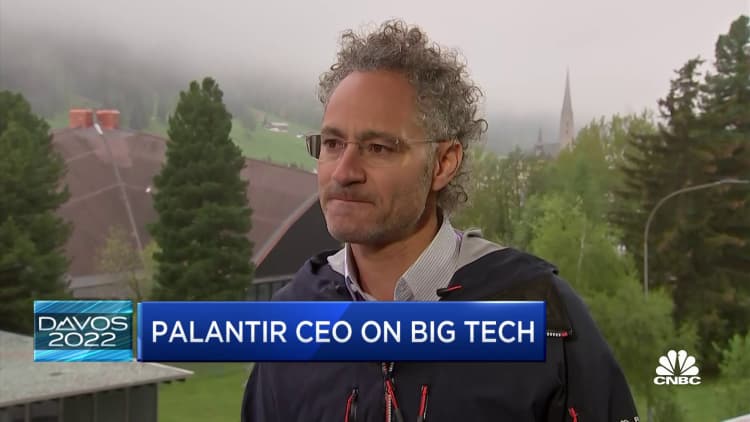Palantir is no stranger to politics. The data mining and software company got its start with government contracts, and 19 years since its inception, Palantir’s government work is still central to its business.
At its start, Palantir’s business came directly from the FBI, the NSA, and even the CIA, whose venture arm In-Q-Tel was one of the company’s earliest backers. CEO and co-founder Alex Karp is a self-proclaimed American patriot. For Karp, data and defense are intertwined, and his company’s contracts with government agencies reflect a commitment to leveraging technology to bolster the West. The company’s earliest splash was reportedly helping to find Osama bin Laden over a decade ago, and this year, Palantir began work for Ukrainian military operations.
In between, the company’s patriotism has prompted some criticism, internally and beyond. Palantir’s work with the U.S. Immigration and Customs Enforcement, or ICE, for example, infamously prompted a flurry of internal employee petitions, sparking nationwide debates about tech’s role in the U.S. and the line between protecting civil liberties and facilitating government duty.
Karp founded the company with well-known conservative tech investor Peter Thiel, and the two have publicly sparred over politics and technology. In an interview at the Aspen Ideas Festival, Karp commented on the division inside Palantir’s leadership. “Look, I think one of the problems in this country is, there are not enough people like Peter and me … we’ve been fighting about things for 30 years,” he told CNBC’s Andrew Ross Sorkin. Still, they run a company well enough together to consistently secure government contracts around the world, the successes of which have led to contracts in the private sector with companies like BP, Merck, and Sanofi.
Shortly after reports surfaced that Palantir assisted in tracking down bin Laden, CNBC rolled out its inaugural Disruptor 50 List in 2013, and Palantir would remain a fixture on the list until it went public via direct listing in 2020. Palantir shares are up about 12.6% since going public, but for 2022, shares are down over 55%.
While a bulk of its business is still for government agencies, work beyond that is growing: commercial revenue was up 120% in its last earnings report from August, while stateside commercial customers were up over 200%. Wall Street analysts covering the stock are split: a quarter have a “buy” rating, a quarter expect underperformance, and the other half have rated Palantir stock a “hold.”
What Palantir is actually doing for its customers, stateside or international, public or private, remains often unclear. From the start the company’s goals were secretive, fitting for a Department of Defense or FBI contractor. However, even as a $16.7 billion market cap publicly traded company, Palantir’s work remains opaque. Karp was the first Western CEO to visit Ukraine and meet with President Volodymyr Zelenskyy during this year’s conflict, and in its earnings call Palantir Chief of Business Affairs and legal officer Ryan Taylor confirmed that the company is “on the forefront of the problems that matter most in the world, from the war in Ukraine to fighting famine and monkeypox.”
But how exactly Palantir is managing those problems is unknown.
In a CNBC interview at this year’s World Economic Forum in Davos in May, Alex Karp estimated a 20%-30% chance of nuclear war in Ukraine. Though a relatively lone prognostication at the time, Karp doubled down on the possible dangers ahead in a September interview on “Squawk Box,” and in so doing, he emphasized his own company’s position in helping Ukraine defend itself against Russia: “Software plus heroism can really slay the giant.”

Secretive though it may be, Palantir has been clear about one major pivot from its CIA roots: health care.
During the height of the Covid-19 pandemic, Palantir assisted with domestic and international vaccine rollout. It has partnered with the CDC, NIH, and FDA in the U.S., as well as England’s NHS. In the private sector, it’s currently working with the health-care business of Japan’s Sompo, as well as Merck and Sanofi.
COO Shyam Sankar told CNBC in August that the company’s work spans health care’s entire value chain. It is “working with government agencies to help them distribute vaccines efficiently, plugging into the pharma companies and biomanufacturing processes that create them, driving the hospital operations that are getting those needles into your arms, and driving the health care outcomes, clearing the backlog in the wake of Covid.”
Palantir is likely to remain as secretive as it started, and Karp, committed to his nuanced politics and patriotism, will likely remain outspoken on both. For 19 years, Palantir’s data mining and analytics software has been the subject of noted successes and protests. Despite backlash, its tech wins hundreds of millions of dollars in contracts each year, employed by the world’s biggest geopolitical players to move chess pieces around the globe.
SIGN UP for our weekly, original newsletter that goes beyond the list, offering a closer look at CNBC Disruptor 50 companies, and the founders who continue to innovate across every sector of the economy.


